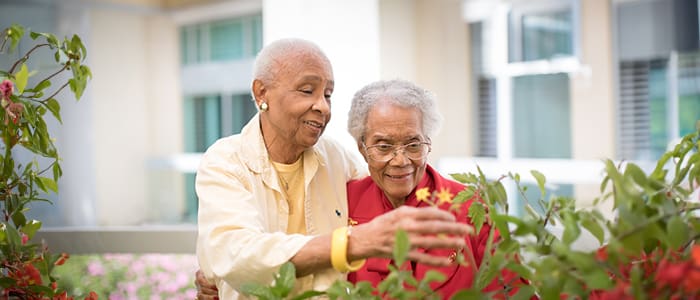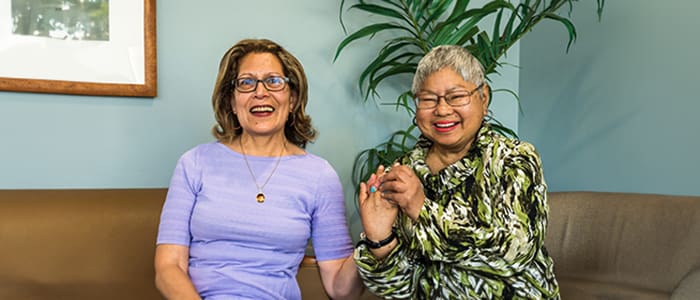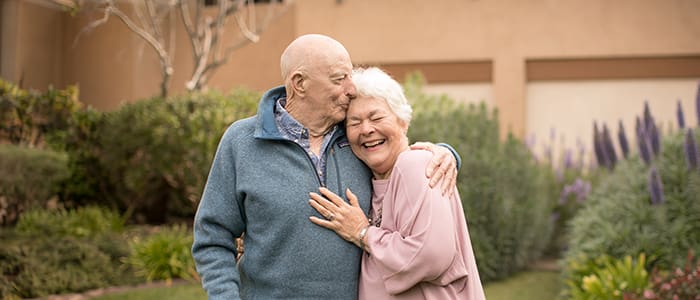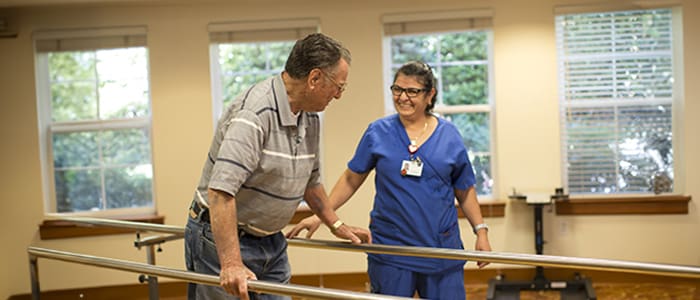January 14, 2021
Vista del Monte’s Caring Companions Provide Peer Support for Residents
The coronavirus pandemic has stirred a variety of emotions and feelings within everyone. Frustration, sadness, anxiety and stress are just a few. For older adults, these feelings may be magnified.
That’s where a sympathetic ear, or a friendly face may go a long way. Whether an older adult is experiencing isolation, coping with illness or loss, or just needs to be heard by a good listener, peer counseling provides a safe way to clarify feelings, thoughts, and concerns.

At Vista del Monte, a group of trained residents called Caring Companions volunteer their time to check on the well-being of other residents and offer one-on-one support. Each Caring Companion has completed an extensive peer counseling training program with the Center for Successful Aging. Training includes learning skills in active listening, being present, attending to non-verbal messages, making connections, seeing discrepancies, identifying must-report situations, and more.
“There are compassionate residents, who are skilled in communicating and listening,” said Vista del Monte‘s spiritual life director, Rev. Laura Mancuso. “As a volunteer program, Caring Companions harnesses these skills to provide support for residents who need it.”
During the pandemic, this peer counseling group has been especially important in making residents feel cared for. Caring Companions typically check in once a week and are available to speak via phone or during a safely distanced visit to a resident’s home. A collaboration between the Health Services Committee of Vista Residents’ Association and Vista’s Spiritual Life Program, Caring Companions’ main role is one of listening and providing a non-judgmental, compassionate presence to residents.
Launched in May 2020, Laura and resident Nancy Hilyard co-lead Caring Companions. “With peer counseling, our goal is to meet the needs of residents,” Nancy said. Currently, five residents receive in-person visits safely and 30 residents receive phone calls. So far, more than 100 Vista del Monte residents have been touched in some way.
Often people underestimate the intelligence and capabilities of older adults. Caring Companions recently composed the following tips to effectively and respectfully communicate with older adults in caring relationships. “We believe these tips are universal as they were written by older adults,” added Nancy.
1. Everything you know about working with people, and adults, applies to older adults. Start there.

2. Avoid solving my problems for me. Support me to solve my own problems instead. Don’t give advice unless it’s specifically requested.
3. Give me time to respond to your questions. Overcome your own discomfort with silence. Let me be the focus of the caring conversation, not you.
4. People in their 80s, 90s, or 100s are still adults. Don’t speak to us like we are children. Seemingly affectionate terms such as “Honey” or “Dear” are inappropriate if you don’t actually know me very well.
5. As people age, others may assume they need help when they don’t. Let me do as much as possible for myself, for as long as possible, even if I do it more slowly than before. Emphasize what I CAN do, not what I can’t.
6. Be respectful. What does that look like? Don’t talk over me or talk about me as if I’m not there. For example, often when people who use wheelchairs are accompanied by a caregiver or loved one, strangers will address the caregiver only. Or strangers may speak to me very loudly, as if I cannot hear, just because I use a wheelchair.
7. Keep it simple. How? Don’t impart too much information at once; instead, address one topic at a time. Make sure I’ve understood you before moving on to the next topic. This is good advice for all ages.
8. If I don’t understand you the first time, don’t keep repeating the same statement or question … ask me in a different way.
9. Most in our generation did not grow up speaking about feelings or seeing therapists. We may have been told how to feel. Asking for help can be difficult as we were taught it was a sign of weakness. Men were generally acculturated not to express fear or sadness, so these may get expressed as anger. Women may have had the opposite experience – that is, it’s un-lady-like to express anger, so we may tend toward sadness or shame.

10. Model speaking from the heart by using “I” statements, not “you should…” Own your own feelings. This will help our conversations go deeper.
11. Hearing loss is common. People may try to cover it up, and this can come across as not being “with it.” If I ask you to repeat yourself, it may simply be that you were speaking too fast. It helps if you reduce background noise and speak more slowly and clearly. I may be supplementing my hearing by watching your lips and body language, so it helps if you face me directly. (Yes, face coverings muffle your voice and make it even more difficult).
12. Larger and bolder fonts in printed material are more accessible for everyone and exclude no one.
“Caring Companions’ willingness to dedicate their time and attention to help other residents is a great example of the strength of community at Vista,” said Executive Director Douglas Tucker. “Meeting the needs of our residents is at the core of what we do at Vista del Monte.”
The post Vista del Monte’s Caring Companions Provide Peer Support for Residents appeared first on Front Porch.






